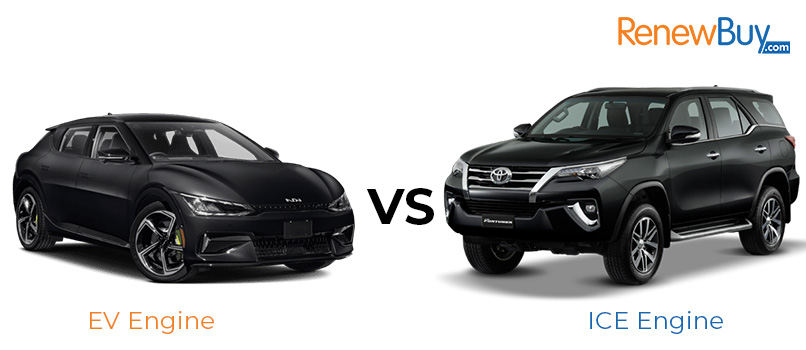In the world of automotive engineering, the question of which engine to choose, be it an internal combustion engine (ICE) or an electric vehicle (EV), has attracted significant attention. As society becomes more aware of environmental impact, the decision between ICE and EV engines becomes important.
Choosing Between ICE and EV Engines: Making an Informed Decision

This article aims to comprehensively analyze both types of engines, highlighting their pros and cons to help you make an informed decision while buying your next vehicle.

Internal Combustion Engines (ICE)
ICE has been the dominant engine technology in the automotive industry for over a century. These engines burn fossil fuels such as gasoline or diesel to generate power. Here are some key points to consider when evaluating ICE engines:
- Performance and Range: ICE engines are known for their power and long-range capabilities. They offer quick acceleration and high top speeds, making them suitable for those who enjoy spirited driving and long-distance travel.
- Refueling Infrastructure: Gasoline and diesel fueling stations are readily available in most areas, making it convenient to refuel ICE vehicles. The widespread infrastructure ensures you can find fuel almost anywhere, reducing the worry of running out of power.
- Maintenance and Cost: ICE engines require regular maintenance, including oil changes, filter replacement, and periodic tune-ups. These maintenance procedures and fuel costs contribute to the overall ownership expense of ICE vehicles.
- Environmental Impact: ICE engines have improved in terms of emissions control, but they still contribute to air pollution and greenhouse gas emissions. Burning fossil fuels releases carbon dioxide (CO2) and other pollutants, which affect climate change and air quality.
Electric Vehicles (EV)
With increasing concern for the environment and advances in battery technology, electric vehicles have gained significant popularity in recent years. Here are some key factors to consider when evaluating EVs:
- Environmental Impact: EVs produce zero tailpipe emissions, making them attractive to those seeking green transportation options. Using electricity, which can be generated from renewable sources, allows EVs to reduce greenhouse gas emissions and improve air quality.
- Fuel and Maintenance Costs: The operating cost of EVs is lower than that of ICE vehicles. The cost of electricity is generally lower than that of gasoline or diesel, resulting in lower fuel expenses. In addition, EVs have fewer moving parts, thereby reducing maintenance and repair costs over time.
- Range and Charging Infrastructure: One of the primary concerns with EVs is their limited range compared to ICE vehicles. However, advances in battery technology have greatly improved range, and charging infrastructure is expanding rapidly. Public charging stations and home charging solutions make charging an EV convenient, although longer journeys may still require careful planning.
- Performance and Driving Experience: EVs provide instant torque and smooth acceleration while providing a pleasant driving experience. While they can't match the top speeds of some high-performance ICE vehicles, EVs excel in low-end acceleration and provide a quieter and more relaxed ride.
Conclusion
Choosing between an ICE and an EV engine depends on a variety of factors, including personal preferences, driving habits, and environmental considerations. ICE engines offer a long-established infrastructure, high performance and range but contribute to air pollution and high operating costs. On the other hand, EVs offer a green alternative with lower emissions, lower operating costs and a quieter driving experience.
As technology advances and infrastructure improves, EVs become a more viable option for a wider range of consumers. Ultimately, your decision should be down to your preferences, considering the benefits and limitations of both engine types and your budget.
Related Article

What is the Difference.....

NREGA Job Card

NREGA Job Card

Mahatma Gandhi National Rural.....

All About NITI Aayog:.....

Benefits of the MGNREGA.....

Insurance Plans Launched by.....

Manual To Automatic Transmission.....
